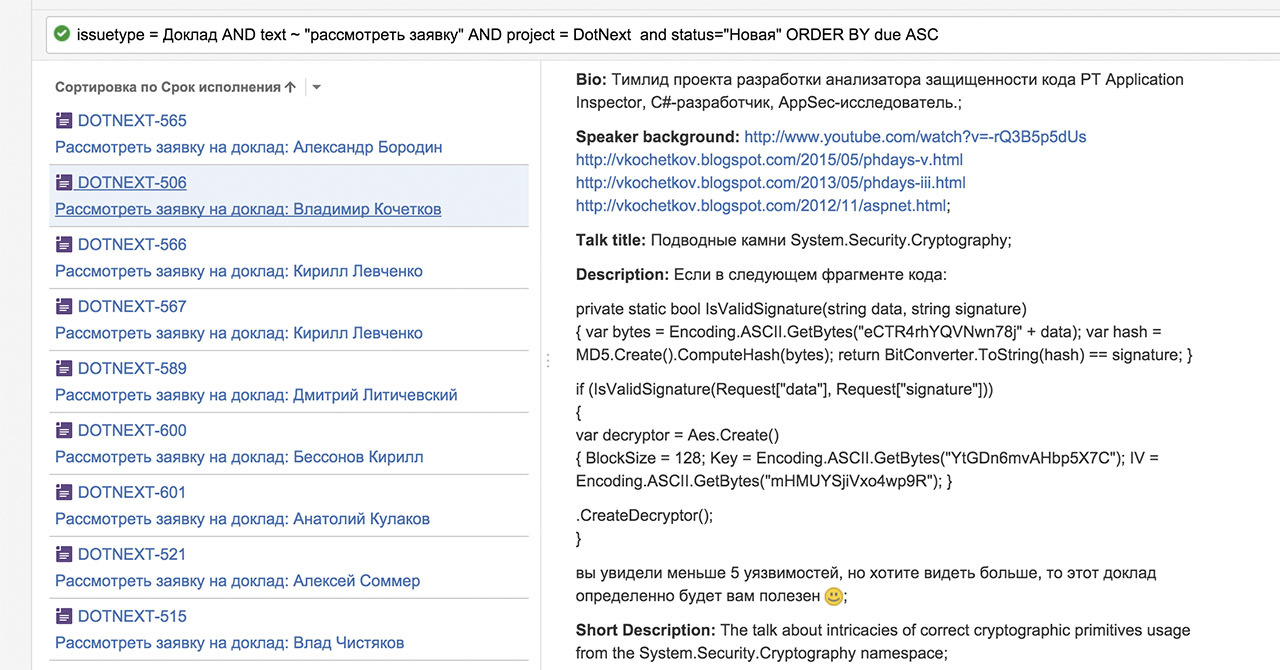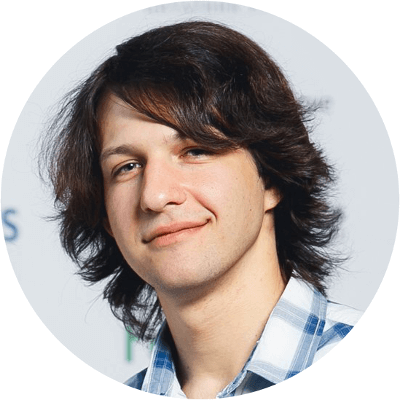Conference DotNext 2015 Moscow: first 7 reports
One and a half months left before the DotNext 2015 Moscow conference. Now we have a hot time - the selection of reports, competitive listening on Skype and live. The skype chat of the program committee constantly pours notifications at me - just have time to respond. The work on incoming requests for reports, to be honest, strongly resembles one well-known show - four members of the program committee are trying to figure out in the announcement text whether the speaker is in front of them or not, a good report or a weak one.

Certainly, PC members do not try to pierce the infinity with reason, they constantly cheat: read the articles of the authors who submitted applications, watch the presentations of their speeches at other conferences and meetings, look at pictures of potential speakers in social networks, trying to understand if they are not dealing with a crazy maniac ( and most often, yes, they have!).
')
We have a little more than thirty applications today. As it should be, we have already accepted a third in the program, a third have been rejected, and a third are competitively selected. For example, below you can see a list of current requests for reports that our program director real_ales still hasn't reached.

Below I will talk a little about those reports and speakers that have already been included in the conference program.

Karlen Simonyan from Luxoft, known in Habré as szKarlen , will make a presentation on “Atomic operations and primitives in .NET” . The topic is wildly interesting and, for example, constantly discussed in the Java world. I, as a person who has worked with Java for many years, in which distinct Atomicists have existed for more than 10 years, this topic is especially close - for example, I recently made a report ( part 1 , part 2 ) on a similar topic on the Moscow Java User Group. (hey, szKarlen , look it, by the way - maybe you will find something interesting for yourself).
From the report of Karlen you will learn:

Dino Esposito , the same author of well-known books for ASP.NET, will make two reports for us.
DDD: Where's the Value? - A report on what Domain-driven design is and why this approach is so important. In general, the approach exists quite a long time ago and was covered several times in the Habré. Dino touched on this topic a little at last year’s Moscow DotNext speaker’s dinner when he talked about how he designed the system for ATP, the largest tennis association, several years ago. The task was to quickly display all the results and other important information for tennis fans. As I understood, at that time Dino understood tennis like a pig in oranges, but the principles of DDD allowed him to do everything he needed in just a couple of months.
Hands-on Experience: What it Means to Design a Domain Model - in this report, Dino will talk about the difference between the domain model and the data storage model in the application, and also explain why it is important to feel the difference.

Dmitry Nesteruk aka mezastel , will tell about one of his favorite topics - writing bots on .NET . In addition to technical evangelism in JetBrains, Dima does much more than others, for example, financial mathematics. And it is in this area that bots can be a very effective solution.
From the report you will learn how to write your bot - what technologies you can use and what design principles to lay the foundation for.
mezastel , by the way, live examples will be? Or just theory-theory? :)

Andrey Akinshin aka DreamWalker will talk about micro-optimizations .
From the report you will learn what exactly happens during the execution of your .NET program. The differences between modern C # and JIT compilers (Roslyn and RyuJIT including) will be discussed, ASM listings will be shown, some points related to code execution on real hardware will be analyzed.
By the way, this speech will be a continuation of the DreamWalker report, which he made on the St. Petersburg DotNext in June. Here is the record - I highly recommend that you familiarize yourself with anyone who is bothering about performance and loves bowels.

Hadi Hariri , who heads the team of technical evangelists at JetBrains, will talk about the near future - HTTP / 2 .
The conversation will go mainly about what is wrong with the HTTP protocol version 1.1, and how it will be fixed in the new version. First of all, the report will be useful to those who are in one way or another connected with the web. It will be about how future changes will affect your applications. In addition, the report will be useful to those who are simply interested in how the technical component of today's main communication protocol in the world is changing.

James Nugent - .NET TCP Servers Done Right .
NOT COMING
The report was supposed to be about how to make a high-performance system on .NET, actively working with I / O, processing many requests per second and not choking at the same time in the permanent garbage collection. The main topic of the report was the transformation of a simple synchronous thread-per-client server into a trendy hipster asynchronous one. In the original, quite elegant: "to use hipster-compliant asynchronous evented IO." I wanted to listen for the sake of this definition alone.
Hopefully next time, James will succeed.

Mikhail Shcherbakov , the leader of the St. Petersburg .NET-party , will talk about WinDbg for the .NET developer . A report on whether WinDbg can and should be used to debug .NET code.
From the report you will learn
Work is in full swing. Within the next two weeks we will publish another 8-10 reports. Accordingly, in a couple of weeks I will talk about what program we ended up with.
More detailed descriptions of the reports (and other details of the upcoming conference) are available on its website . Well, videos of past conferences are available on our Youtube channel .

Certainly, PC members do not try to pierce the infinity with reason, they constantly cheat: read the articles of the authors who submitted applications, watch the presentations of their speeches at other conferences and meetings, look at pictures of potential speakers in social networks, trying to understand if they are not dealing with a crazy maniac ( and most often, yes, they have!).
')
We have a little more than thirty applications today. As it should be, we have already accepted a third in the program, a third have been rejected, and a third are competitively selected. For example, below you can see a list of current requests for reports that our program director real_ales still hasn't reached.

Below I will talk a little about those reports and speakers that have already been included in the conference program.

Karlen Simonyan from Luxoft, known in Habré as szKarlen , will make a presentation on “Atomic operations and primitives in .NET” . The topic is wildly interesting and, for example, constantly discussed in the Java world. I, as a person who has worked with Java for many years, in which distinct Atomicists have existed for more than 10 years, this topic is especially close - for example, I recently made a report ( part 1 , part 2 ) on a similar topic on the Moscow Java User Group. (hey, szKarlen , look it, by the way - maybe you will find something interesting for yourself).
From the report of Karlen you will learn:
- how to reduce memory model differences between .NET and Mono on x86, Itanium and ARM architectures;
- where the atomic operations came from and what their purpose is;
- how to implement non-blocking synchronization and reduce the number of boilerplate code for atomic operations;
- examples of the effective use of the capabilities of modern processors in .NET;
- and finally, the elegant solution of the questions above thanks to the atomics.net library.

Dino Esposito , the same author of well-known books for ASP.NET, will make two reports for us.
DDD: Where's the Value? - A report on what Domain-driven design is and why this approach is so important. In general, the approach exists quite a long time ago and was covered several times in the Habré. Dino touched on this topic a little at last year’s Moscow DotNext speaker’s dinner when he talked about how he designed the system for ATP, the largest tennis association, several years ago. The task was to quickly display all the results and other important information for tennis fans. As I understood, at that time Dino understood tennis like a pig in oranges, but the principles of DDD allowed him to do everything he needed in just a couple of months.
Hands-on Experience: What it Means to Design a Domain Model - in this report, Dino will talk about the difference between the domain model and the data storage model in the application, and also explain why it is important to feel the difference.

Dmitry Nesteruk aka mezastel , will tell about one of his favorite topics - writing bots on .NET . In addition to technical evangelism in JetBrains, Dima does much more than others, for example, financial mathematics. And it is in this area that bots can be a very effective solution.
From the report you will learn how to write your bot - what technologies you can use and what design principles to lay the foundation for.
mezastel , by the way, live examples will be? Or just theory-theory? :)

Andrey Akinshin aka DreamWalker will talk about micro-optimizations .
From the report you will learn what exactly happens during the execution of your .NET program. The differences between modern C # and JIT compilers (Roslyn and RyuJIT including) will be discussed, ASM listings will be shown, some points related to code execution on real hardware will be analyzed.
By the way, this speech will be a continuation of the DreamWalker report, which he made on the St. Petersburg DotNext in June. Here is the record - I highly recommend that you familiarize yourself with anyone who is bothering about performance and loves bowels.

Hadi Hariri , who heads the team of technical evangelists at JetBrains, will talk about the near future - HTTP / 2 .
The conversation will go mainly about what is wrong with the HTTP protocol version 1.1, and how it will be fixed in the new version. First of all, the report will be useful to those who are in one way or another connected with the web. It will be about how future changes will affect your applications. In addition, the report will be useful to those who are simply interested in how the technical component of today's main communication protocol in the world is changing.

NOT COMING
The report was supposed to be about how to make a high-performance system on .NET, actively working with I / O, processing many requests per second and not choking at the same time in the permanent garbage collection. The main topic of the report was the transformation of a simple synchronous thread-per-client server into a trendy hipster asynchronous one. In the original, quite elegant: "to use hipster-compliant asynchronous evented IO." I wanted to listen for the sake of this definition alone.
Hopefully next time, James will succeed.

Mikhail Shcherbakov , the leader of the St. Petersburg .NET-party , will talk about WinDbg for the .NET developer . A report on whether WinDbg can and should be used to debug .NET code.
From the report you will learn
- how is WinDbg useful for a dnet programmer?
- how to set up this tool so that its daily use stops causing pain and really saves time;
- basic operations and scripts for debugging .NET and mixed code, demonstrating the full power of this tool;
- How WinDbg can be useful to a web developer, which applications will allow to solve.
Work is in full swing. Within the next two weeks we will publish another 8-10 reports. Accordingly, in a couple of weeks I will talk about what program we ended up with.
More detailed descriptions of the reports (and other details of the upcoming conference) are available on its website . Well, videos of past conferences are available on our Youtube channel .
Source: https://habr.com/ru/post/269595/
All Articles